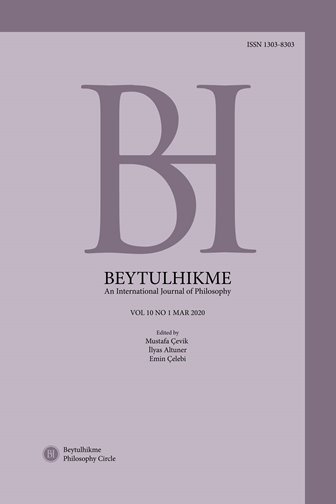Author :
Abstract
Kant’ın estetik felsefesi, eleştiri felsefesinin geneli düşünüldüğünde tutarlı bir şekilde transandantal özneye bağlıdır. Dolayısıyla transandantal özne teorik felsefede hangi rolü üstlenmişse, estetik ve ahlak felsefelerinde de aynı rolü üstlenmektedir. Bu bağlamda Kant üzerine yapılacak bir çalışmanın, transandantal özne üzerinden yürütülmesi gereklilik olarak ortaya çıkmaktadır. Bununla birlikte müzik felsefesine transandantal özne üzerinden yaklaşmak, özellikle Kant’ın üçüncü eleştirisi olan Yargı Yetisinin Eleştirisi’ne odaklanmayı sağlamakla birlikte, ilk iki eleştirisinden de ayrılmayacağının ve eleştiri felsefesinin bir bütün olduğunun ön kabulünü de gerektirmektedir. Bu çalışmanın amacı, Kant’ın Yargı Yetisinin Eleştirisi’nde müzik felsefesi adına ortaya koyduğu bir takım düşünceleri belirlemek ve elde edilen bu bulguları, transandantal özne minvalinde eleştiri felsefesiyle olan tutarlılığını incelemektir. Bu bağlamda araştırmanın sonucu olarak, Kant’ın müzik üzerine olan düşüncelerinin alanına yaptığı katkı değerlendirilmiştir.
Keywords
Abstract
Kant's aesthetic philosophy is linked to the transcendental subject consistently, considering the general philosophy of criticism. The role of the transcendental subject, in theoretical philosophy, therefore, serves the same function in aesthetic and moral philosophies. In this context, it is of necessity to consider the transcendental object while studying Kant’s philosophy. However, approaching the philosophy of music through the transcendental subject necessitates a focus on Kant's third critique, The Critique of Judgement But it also requires the preliminary acceptance that the third criticism is not separated from the first two critics as Kant’s philosophy of criticism should be evaluated together. This study aims to focus on some ideas that Kant put forward in The Critique of Judgement within the context of a philosophy of music and to examine the consistency of these findings with the philosophy of criticism on the transcendental subject. In this regard, as a result of the research, Kant's contributions to the field of philosophy of music have been evaluated.
Keywords
- Cassirer, E. (1996). Kant’ın Yaşamı ve Öğretisi. (Çev. D. Özlem). İstanbul: İnkılap Kitabevi.
- Deleuze, G. (1995). Kant’ın Eleştirel Felsefesi. (Çev. T. Altuğ). İstanbul: Payel Yayı- nevi.
- Deleuze, G. (2015). Kant Üzerine Dört Ders. (Çev. T. Kılıç). İstanbul: Kabalcı Yayı-
- Gracyk, T. & Kaina, A. (ed.) (2011). The Routledge Companion to Philosophy and Music. London: Routledge, 328-339.
- Grove, G. (ed.) (2009). Dictionary of Music and Musicians A.D. 1450-1880, vol. 4. Cambridge: Cambridge University Press.
- Kant, I. (2010). Arı Usun Eleştirisi. (Çev. A. Yardımlı). İstanbul: İdea Yayınevi.
- Kant, I. (2009). Pratik Aklın Eleştirisi. (Çev. İ. Kuçuradi). Ankara: Türkiye Felsefe Kurumu Yayınları.
- Kant, I. (1977). Prolegomena to Any Future Metaphysics. (Trans. P. Carus). Indiana- polis: Hackett Publishing Company.
- Kant, I. (2011). Yargı Yetisinin Eleştirisi. (Çev. A. Yardımlı). İstanbul: İdea Yayıne- vi.
- Kivy, P. (2010). Philosophy of Music. Oxford: Oxford Universty Press.
- Locke, J. (2017). İnsan Anlağı Üzerine Bir Deneme (Çev. V. Hacıkadiroğlu). İstanbul: Kabalcı Yayınevi.
- Matherne, S. (2014). Kant’s Expressive Theory of Music. The Journal of Aesthetics and Art Criticism, 72 (2), 129-145.
- Schopenhauer, A. (1969). The World as Will and Representation, vol. I. (Trans. E. F. J. Payne). New York: Dover Publications.
- Sözen, M. & Tanyeli, U. (1992). Sanat Kavram ve Terimleri Sözlüğü. İstanbul: Rem- zi Kitabevi.
- Tunalı, İ. (2012). Estetik. İstanbul: Remzi Kitabevi. Öz: Kant’ın estetik felsefesi, eleştiri felsefesinin geneli düşünüldüğünde tutarlı bir şekilde transandantal özneye bağlıdır. Dolayısıyla transandantal özne teorik felsefede hangi rolü üstlenmişse, estetik ve ahlak felsefelerinde de aynı rolü üstlenmektedir. Bu bağlamda Kant üzerine yapılacak bir çalışmanın, transandantal özne üzerinden yürütülmesi gereklilik olarak ortaya çıkmaktadır. Bununla birlikte müzik felsefesine transandantal özne üzerinden yaklaşmak, özellikle Kant’ın üçüncü eleştirisi olan Yargı Yetisinin Eleştirisi’ne odaklanmayı sağlamakla birlikte, ilk iki eleştirisinden de ayrılmayacağının ve eleştiri felsefesinin bir bütün olduğunun ön kabulünü de gerektirmektedir. Bu çalışmanın amacı, Kant’ın Yargı Yetisinin Eleştirisi’nde müzik felsefesi adına ortaya koyduğu bir takım düşünceleri belirlemek ve elde edilen bu bulguları, transandantal özne minvalinde eleştiri felsefesiyle olan tutarlılığını incelemektir. Bu bağlamda araştırmanın sonucu olarak, Kant’ın müzik üzerine olan düşüncelerinin alanına yaptığı katkı değerlendirilmiştir. Anahtar Kelimeler: Kant estetiği, müzik felsefesi, transandantal özne, eleştiri felsefesi, beğeni.





